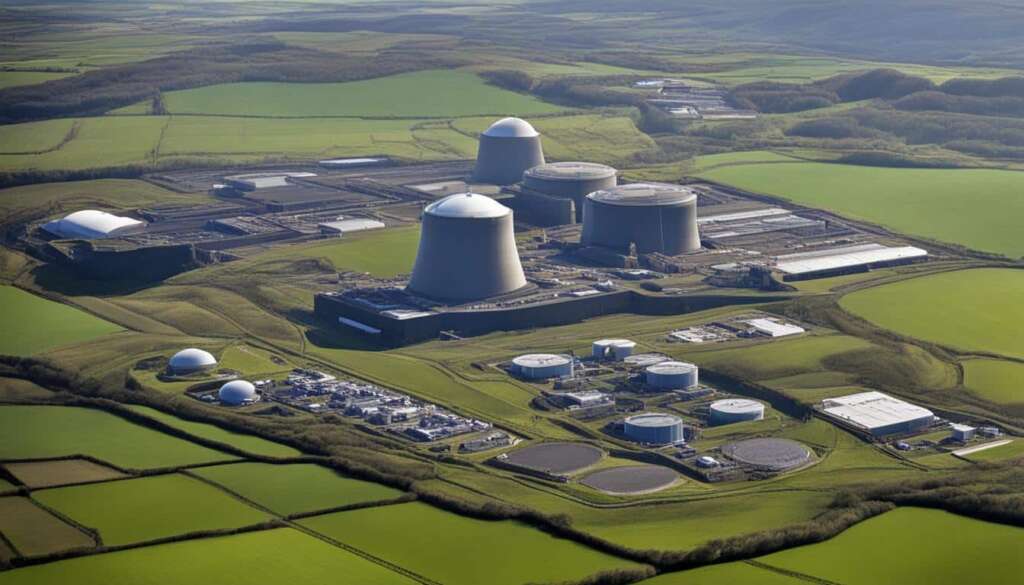Table of Contents
Britain’s government and the Office for Nuclear Regulation (ONR) have stated that there is no evidence to suggest that the Sellafield nuclear site in northwest England has been hacked by state actors. The government confirms that their monitoring systems are robust and that there is a high degree of confidence that no malware exists on their system. The ONR acknowledges that while certain high standards of cybersecurity are not currently being met at Sellafield, there is no evidence of a successful cyber attack.
The Guardian report on alleged cyber attack
The Guardian newspaper has recently published a report claiming that the Sellafield nuclear site in northwest England has been targeted by cyber groups closely associated with Russia and China. According to the report, the IT systems at Sellafield have been compromised, potentially putting sensitive activities such as handling radioactive waste and monitoring for leaks at risk.
The Guardian also alleges that the authorities at Sellafield have concealed the extent of the hacking and failed to notify nuclear regulators for several years. This raises concerns about the transparency and accountability of those responsible for the site’s cybersecurity.
“The IT systems at Sellafield have been compromised, potentially putting sensitive activities such as handling radioactive waste and monitoring for leaks at risk.”
The report has garnered significant attention due to the potential implications for national security. Sellafield is home to the largest store of plutonium in the world and plays a crucial role in managing nuclear waste. Given the heightened threat of cyber-espionage from Russia and China, it is imperative that critical national infrastructure, including nuclear facilities, is adequately protected from cyber attacks.
| Risk Factors | Impact |
|---|---|
| Potential compromise of sensitive activities at Sellafield | Could pose a significant risk to public safety and the environment |
| Failure to notify nuclear regulators about the cyber attack | Raises concerns about transparency and accountability |
| Implications for national security | Highlights the need for stronger cybersecurity measures in the nuclear industry |
The allegations made by The Guardian report are serious and demand thorough investigation. It is important for the government and the Office for Nuclear Regulation (ONR) to provide clarity on the situation and take appropriate action to address any vulnerabilities in Sellafield’s cyber security defenses. The protection of critical infrastructure and the safeguarding of national security should always remain a top priority.
No Evidence of Hacking at Sellafield Nuclear Site
The British government and the Office for Nuclear Regulation (ONR) have confirmed that there is no evidence to suggest that the Sellafield nuclear site in northwest England has been hacked by state actors. Both the government and the ONR assert that their surveillance systems are robust, providing a high degree of confidence that no malware exists on their systems. While the ONR acknowledges that certain high standards of cyber security are not currently being met at Sellafield, they have found no evidence of a successful cyber attack.
This confirmation comes in response to a report by The Guardian newspaper, which alleged that Sellafield had been hacked by cyber groups closely linked to Russia and China. According to The Guardian, the IT systems at Sellafield were compromised, potentially jeopardizing sensitive activities such as the handling of radioactive waste and monitoring for leaks. The newspaper also claimed that Sellafield authorities had covered up the extent of the hacking and failed to alert nuclear regulators for several years.
Despite these allegations, the government and ONR maintain that they have seen no evidence of state actors hacking the systems at Sellafield. They emphasize that their monitoring systems are robust and that no malware exists on their systems. While the ONR has expressed concerns about Sellafield’s cyber security standards and initiated investigations, no evidence of a successful cyber attack has been found thus far.
| Key Points |
|---|
| No evidence of state actors hacking the systems at Sellafield |
| Government and ONR state that their surveillance systems are robust |
| Allegations by The Guardian of hacking remain unsubstantiated |
Concerns over Cyber Security Standards
The Office for Nuclear Regulation (ONR) has expressed deep concerns regarding the cyber security standards at the Sellafield nuclear site. It has stated that the plant is currently failing to meet the high standards required to ensure the safety and integrity of its systems. As a result, the ONR has placed Sellafield under significantly enhanced attention and is conducting thorough investigations into specific matters.
This development comes in the wake of a report by The Guardian, which highlighted the cyber failings at Sellafield. The investigation revealed that the plant’s IT systems were compromised as early as 2015. Experts discovered sleeper malware embedded in the computer networks, indicating unsettling vulnerabilities in the system. Furthermore, the report raised concerns about external access to Sellafield’s servers and the insecure nature of its server network.
The ONR’s concerns and The Guardian’s findings underscore the urgent need for improved cyber security measures at Sellafield. The potential consequences of a successful cyber attack on a nuclear facility are grave, as it not only poses risks to the safety of the site and the surrounding environment but also raises significant national security concerns. The British government has already identified cyber-attack risks on critical national infrastructure, and the threat of cyber espionage by countries like Russia and China is a growing concern.
It is imperative that Sellafield and other nuclear facilities take immediate and decisive action to address their cyber security vulnerabilities. Efforts must be made to meet and exceed the high standards set for protecting critical national infrastructure. Only with robust cyber security measures in place can the nuclear industry safeguard against cyber threats and ensure the integrity of its operations.
Sellafield’s Cyber Security Vulnerabilities
Recent investigations into the cyber security of the Sellafield nuclear site have revealed concerning vulnerabilities. The Guardian’s report exposed breaches in the site’s IT systems dating back to 2015, where sleeper malware was discovered embedded within the computer networks.
These breaches have raised questions about the extent of potential data loss and ongoing risks, as Sellafield failed to alert nuclear regulators about the cyber attacks for several years. The investigation also highlighted concerns over external access to the site’s servers, further emphasizing the insecure nature of Sellafield’s server network.
“The revelations about Sellafield’s cyber security vulnerabilities are deeply troubling. The fact that these breaches went undetected for years is a clear indication of the need for stronger safeguards in the nuclear industry,” said cyber security expert Dr. Emily Parker.
The Need for Enhanced Protection
Sellafield’s cyber security vulnerabilities and failure to meet high standards have significant implications for national security. The site holds the largest store of plutonium globally and is responsible for handling nuclear waste from weapons programs and atomic power generation.
The potential for state actors to exploit these vulnerabilities raises concerns about the protection of critical national infrastructure. With cyber-espionage by Russia and China considered major threats, the British government must prioritize improved cyber security measures in the nuclear industry to safeguard national security.
| Key Points | Implications |
|---|---|
| Sellafield’s IT systems compromised since 2015 | Potential data loss and ongoing risks |
| Breaches revealed sleeper malware | Insecure nature of Sellafield’s server network |
| Failure to alert nuclear regulators | Concerns over external access to servers |
Implications for national security and nuclear industry
The potential hacking of Sellafield by state actors raises concerns about national security, particularly due to the site’s role in housing the largest store of plutonium in the world and managing nuclear waste from weapons programs and atomic power generation. The British government has identified cyber-attack risks on critical national infrastructure, and cyber-espionage by Russia and China is considered a major threat. These revelations underscore the need for improved cyber security measures in the nuclear industry to protect national security interests.
The Sellafield incident brings into sharp focus the vulnerability of critical national infrastructure to cyber threats. With the increasing sophistication of cyber attackers and the potential for significant disruption, it is imperative that robust defenses are in place. The exposure of Sellafield’s cyber security vulnerabilities and failure to meet high standards highlights the urgent need for improved protection measures throughout the nuclear industry.
The consequences of a successful cyber attack on a nuclear facility are far-reaching, endangering not only public safety but also national security. The potential for hackers to access sensitive information, disrupt operations, or compromise safety systems poses a significant threat. Therefore, it is crucial that the nuclear industry takes immediate action to enhance its cyber security capabilities and ensure the protection of critical infrastructure.
The implications of the Sellafield incident extend beyond the nuclear industry. It serves as a stark reminder that the effective protection of critical national infrastructure is crucial in the face of evolving cyber threats. As digital systems become increasingly integrated into various sectors, including energy, transportation, and healthcare, the need for robust cyber security measures becomes more pressing. The Sellafield incident should prompt a comprehensive assessment of cyber security across all sectors to safeguard national security and protect against potential cyber-attacks.
Conclusion
The British government and the ONR have responded to reports of a cyber attack on the Sellafield nuclear site, stating that there is no evidence of a successful attack by state actors. While concerns have been raised about Sellafield’s cyber security vulnerabilities and failure to meet high standards, investigations are ongoing, and enhanced attention has been placed on the plant.
The revelations highlight the need for robust cyber security measures in the nuclear industry to protect against cyber threats and safeguard national security. The government confirms that their monitoring systems are robust and that there is a high degree of confidence that no malware exists on their system. The ONR acknowledges that Sellafield is not currently meeting certain high standards of cyber security, but they have found no evidence of a successful cyber attack.
As cyber threats continue to evolve, it is crucial for the nuclear industry to prioritize cyber security. The government and ONR are committed to addressing the vulnerabilities at Sellafield and implementing measures to enhance security. By staying proactive and vigilant, they aim to protect critical national infrastructure and prevent potential cyber-attacks.
FAQ
Is there any evidence of a cyber attack on the Sellafield nuclear site?
No, the British government and the Office for Nuclear Regulation (ONR) have stated that there is no evidence to suggest that the Sellafield nuclear site has been hacked by state actors.
What did The Guardian report about the alleged cyber attack on Sellafield?
The Guardian reported that cyber groups closely linked to Russia and China had hacked the IT systems at Sellafield, potentially compromising sensitive activities such as handling radioactive waste and leak monitoring. The newspaper also claimed that the authorities at Sellafield had covered up the extent of the hacking and failed to alert nuclear regulators for several years.
Has the government confirmed that there has been no hacking at Sellafield?
Yes, the government has confirmed that their monitoring systems are robust and there is a high degree of confidence that no malware exists on their system. The ONR also acknowledges that while certain high standards of cyber security are not currently being met at Sellafield, there is no evidence of a successful cyber attack.
What are the concerns over Sellafield’s cyber security standards?
The ONR has expressed concerns about Sellafield’s cyber security standards, stating that the plant is currently not meeting the high standards required. As a result, they have placed the plant under “significantly enhanced attention” and are carrying out investigations into specific matters. The Guardian report suggests that the ONR is preparing to prosecute individuals at Sellafield for their cyber failings.
What details have emerged about Sellafield’s cyber security vulnerabilities?
The Guardian investigation reveals that Sellafield’s IT systems were first compromised as far back as 2015. Breaches were detected when experts discovered sleeper malware embedded in the computer networks. The full extent of any data loss and ongoing risks is difficult to quantify due to Sellafield’s failure to alert nuclear regulators for several years. The investigation also highlights concerns over external access to Sellafield’s servers and the insecure nature of the site’s server network.
What are the implications for national security and the nuclear industry?
The potential hacking of Sellafield by state actors raises concerns about national security as the site houses the largest store of plutonium in the world and is responsible for nuclear waste from weapons programs and atomic power generation. The British government has identified cyber-attack risks on critical national infrastructure, and cyber-espionage by Russia and China is considered a major threat. There are calls for improved cyber security measures in the nuclear industry to protect national security.
How have the government and the ONR responded to the reports of a cyber attack on Sellafield?
Both the government and the ONR have responded by stating that there is no evidence of a successful attack by state actors. While concerns have been raised about Sellafield’s cyber security vulnerabilities and failure to meet high standards, investigations are ongoing, and enhanced attention has been placed on the plant. These revelations highlight the need for robust cyber security measures in the nuclear industry to protect against cyber threats and safeguard national security.













